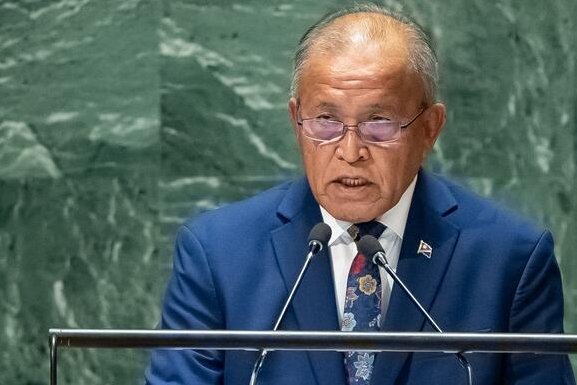President David Kabua says the future of the Marshall Islands and all low lying islands states hangs in the balance due to the effects of climate change.
He told the 78th UN General Assembly General debate, the Marshall Islands believes that the time for speeches and eloquence of talk is over.
“It is time for eloquence of actions. Let deeds, not words be our operating principle.
“Our own islands security is at stake – not only by the tension between superpowers but by rising seas and changing oceans. The world has spent a full generation falling short in our common goals to avoid dangerous climate change,” President Kabua told world leaders in New York.
He said for over thirty years, Marshallese leaders, as is the case with leaders of low-lying island states have sounded the alarm in every international and regional forums.
“For over thirty years, the world has been meeting and talking about the adverse affect of global warming and climate change. We hailed the historic conclusion of the Paris Agreement. However, eight years has gone by, and carbon emission levels remains high and the Planet is getting hotter with each passing day.
“As a matter of fact, the Secretary-General himself has affirmed that the “era of global warming has ended”, “now we have entered the age of global boiling”. May I again reiterate my humble call for the world to declare war on climate change?
And we are past the hour of waiting for a real step-up in ambition. This year must be different. At COP 28, the global stocktake must mark the turning point at which we all recognise that we are collectively failing to deliver on the Paris agreement, and we must all respond by agreeing upon a clear roadmap to correct our course,” said President Kabua.
This ambition roadmap must include the phase-out of fossil fuels, he reiterated.
“The world can’t afford to further ignore the issue at the heart of the crisis. Though we must use every tool at our disposal, we cannot place our hope in dreams of unproven, untested solutions, or use “abatement technology” to greenlight the continued expansion of fossil fuels.
For the most vulnerable nations, adequate, predictable and accessible finance is crucial, particularly for adapting to prepare for the present and future onslaught of the impacts of climate change, and addressing the loss and damage that is already being experienced, said President Kabua.
“We need donors to deliver on their existing commitments, and to come together to address the climate finance crisis in a way which is led by the science and the needs of vulnerable states.
These challenges might be inconvenient for large economies – but I can assure the climate impacts already at our door, and those yet to come, are decidedly more inconvenient for low-lying atoll states like mine, and for other island nations around the world,” he said.
President Kabua said today, the Marshall Islands is encountering insurmountable challenges in coping with sea-level rise, erosion of shorelines, flooding caused by high tides, coral bleaching, intrusion of seawater into taro and crop lands and the rapid deterioration of the ocean ecological system.
“Moreover the warming of the ocean has affected coastal sustainable fishery and posed a direct negative impact on our way of life. In sum, our islands, our culture, our way of life, and our very existence as a people and nation is threatened.
“We call for the establishment of an international financing facility to provide assistance and support to Small Islands Developing States and Low Lying Atoll Nations and territories devastated during and after natural disasters as well as offer elements of insulation from external shocks, be it energy, supply -chain disruptions, food security, global health pandemics, hyper-inflation and other challenges,” President Kabua told World leaders at the UN General Assembly.
SOURCE: PACNEWS














